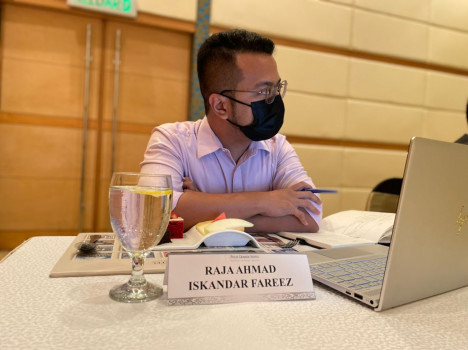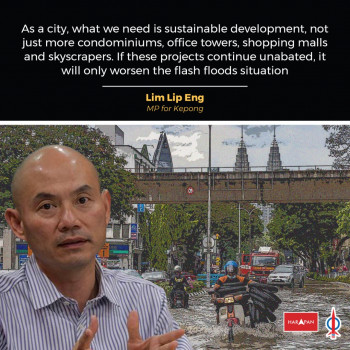by Boon Kia Meng
Wake up and smell the future. Not a utopia where perfect democracy is realised, nor a dystopic future of another century of unbroken UMNO-BN rule. It is the concrete, shaping of history by countless ordinary Malaysians, a culmination of years of accumulated social forces bursting the present ‘order of things’ at its seams.
Tun Abdul Razak once said that, “So long as the form [of democracy] is preserved, the substance can be changed to suit the conditions of a particular country.” This ‘form of democracy’ is now crumbling, buffeted by the strong, post-GE13 waves of change.
If there is any doubt still on the minds of social and media observers, the arrest of student activist, Adam Adli, on Saturday, May 18th, and his subsequent 5 day remand at Jinjang Police Station, provided another occasion for these social forces to gather and express their popular discontent towards the BN government.
Adam Adli has since been charged under Section 4(1) of the Sedition Act 1948 and released on bail, pending hearing on July 2nd. His speech at a forum on May 13th is now alleged to be seditious in nature (you can watch it here: https://www.youtube.com/watch?v=z_nZDttvnNI ).
Following on from the huge turn-outs at the ‘Blackout 505’ rallies, where some 120,000 persons attended in Stadium Kelana Jaya alone, the Rakyat has once again surprised those who were so used to a passive and subservient Malaysian citizenry, perhaps epitomised best during the Mahathir-era. This time, the place of gathering was outside the four walls of a Malaysian Police Station, the very symbol of state oppression and violence.
Again, more than a thousand people gathered in this urban ‘new village’, itself a reminder of the British colonial regime that first installed the quasi-militaristic nature of the Malaysian police force (Polis DiRaja Malaysia), as well as draconian laws such as the Sedition Act and other Emergency Ordinances.
Historical Perspective
It was a most poignant of moments, when PSM (Parti Sosialis Malaysia) chairperson and activist, Dr. Nasir Hashim reminded the crowd, mostly holding candles in vigil, declaring that ‘’we are still colonised in our own country.’ One must never fail to notice the clear pattern of authoritarian rule that runs all the way back to the founding years of the nation.
Some 59 years ago, incidentally in the month of May as well, a group of university students were charged for sedition when they published an article in the newsletter of the University Malaya Socialist Club. The article entitled “Aggression in Asia”, criticised imperialism and colonialism, to the chagrin of the British imperial masters. As a result of the infamous trial, the students became an inspiration to the anti-colonial movement of their time, earning them the moniker of the ‘Fajar Generation’.
Post-colonial Malaysia is now wearing her neo-colonial cloak in all her sovereign glory, visiting the very same forms of state violence and punishment on her citizens, of which Adam Adli is but the latest of victims. What is the capacity and reach of one Adam Adli to incite anything or anyone compared to the BN government’s limitless power and resources to continually incite and perpetrate state violence on her own citizens?
What truly beggars belief is that Ahmad Zahid Hamidi and Khalid Abu Bakar is going on an orgy of arrests, just a few days after their new appointments as Home Minister & Inspector-General of Police, respectively (three other persons have since been arrested today, pending sedition charges, namely activist Haris Ibrahim, PKR MP Tian Chua and former UMNO leader, Tamrin Ghafar Baba).
Portent of things to come
On top of that, 18 ordinary Malaysians, most of them very young, were arrested last night at the solidarity vigil for Adam Adli. Hundreds of others refused to leave and clamoured for the immediate release of their fellow citizens. Finally, in batches of twos and threes, they were released to huge applause:
This is turning into a celebration party. A number are released.
One, a young girl of 15, clutching her IPAD. She just bowed when the crowd applauded.
Another man testified he was beaten, but he will not give up.
Another lady says she came here in peace, but the police grabbed her from behind the barricade. She insists she has done nothing wrong.
The Rakyat cheers.
#bebaskanAdamAdli’
– Facebook status, 2 am, May 23.
Today, Adam Adli and the ‘505’ Generation poses a much bigger problem to the powers-that-be, with the endless proliferation of Facebook and Twitter shares that multiply real-time political experiences at a qualitative scale, not just mere quantities. The young that flooded the stadiums in recent times, collaborate and create public squares on social media platforms, in ways that escape tight, authoritarian controls by the state. There is a direct correlation between this new techno-politico phenomena and the presence of countless fresh-faced Malaysian youth at these protests, many of them toting their IPADs and snapping pictures incessantly with their smartphones.
Facebook pages were flooded with messages of ‘We are all Adam Adli’ and hashtags such as #bebaskanAdamAdli bear a striking resemblance with pages from the Egyptian revolution that toppled the dictator, Hosni Mubarak, two years ago. Some have even made comparisons between the iconization of Adam Adli here in Malaysia, with Wael Ghonim, the infamous Egyptian activist who organised the protests via Facebook. Real-time sharing of pictures of Adam while in police custody has struck a chord of authenticity among Malaysians, especially the young. There are no simple generalisations, as the situation and conditions of both countries are very different. But this new element of youth-driven protests, augmented and multiplied through social media platforms, forms the stuff of political reality in Malaysia, post-GE13.
Ending the Mahathirist state
As I’ve written here previously, I have argued that the Malaysian state in its present form is suffering from a systemic crisis of authority. (you can read it here: http://asiapacific.anu.edu.au/newmandala/2013/04/25/goodbye-lenin-hail-the-malaysian-caesar/ ) This authority to rule is maintained through a combination of both coercion and consent. UMNO-BN has failed in its attempt at hegemony, via the manufacturing of democratic consent, where its loss of the national popular vote (winning only 47% of the votes cast, compared to Pakatan Rakyat’s 51%), is the clearest of indications. It is now resorting to draconian coercive laws such as the Sedition Act, as the means to crush legitimate dissent. Since it no longer commands political and ideological leadership over subordinate groups, the regime reverts to exercising force and coercion as a means to survive.
The present wave of protests seem to suggest a fundamental shift in Malaysian society today – there is a collective change of mood, away from passive and subservient acceptance of an authoritarian political order towards an active and deliberate questioning of its legitimacy. It is a revolt against Mahathirism, the established political regime that combines both an authoritarian government with a rent-seeking market economy which benefits the elite. Just as the Arab Spring saw the return of ‘the people’ to the centre stage of political power and the undoing of what has been called the mukhabarat states, Malaysians are now faced with an equally daunting historical task of undoing the Mahathirist state (mukhabarat, meaning the intelligence or secret police in Arabic).
We need to see that the politicians who are only too quick to invoke the simplistic binary opposition of Malay versus Chinese, actually blinds us of the relations of power sustained by such phrases as the ‘Chinese tsunami’, selectively forgetting the countless other identities that make up our nation, which precisely works to the benefit of the ruling classes. There is no better time for Malaysians to gain such critical consciousness apart from the present, when the state’s arbitrary use of force and violence is unleashed upon ordinary citizens. Malaysians suffer from a collective fetishistic disavowal when it comes to Mahathirism. We criticise his authoritarianism from time to time, but would secretly trade our democratic freedoms away the moment there appears a great leader who can guarantee us peace, security and economic prosperity. The time to free ourselves from this national pathology is now. There is no other alternative.
First they came for the Socialist EO6, and I did not speak out–
Because I was not a Socialist.
Then they came for Tian Chua on the Lahad Datu issue, and I did not speak out–
Because I was not a PKR member.
Then they came for Adam Adli, and I did not speak out–
Because I was not a Malay university student.
Then they came for me–
and there was no one left to speak for me.
(adapted from Martin Niemöller, a prominent Protestant pastor who opposed the Nazi regime. He spent the last seven years of Nazi rule in concentration camps. Germany, 1937.)
* Boon Kia Meng is an activist-filmmaker. His film ‘M-C-M’: Utopia Milik Siapa?’, a winner at the Freedom Film Festival 2012, documenting the issue of escalating house prices and debt in Malaysia, can be viewed here:https://www.youtube.com/watch?v=hv9bWjgEXtc
* The views expressed here are the personal opinion of the columnist



